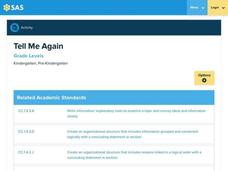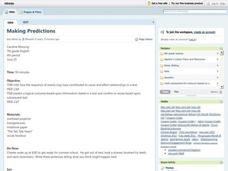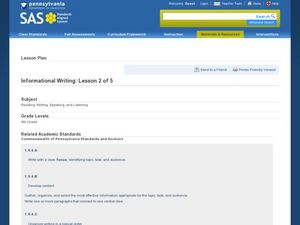Pennsylvania Department of Education
Tell Me Again
Students demonstrate how to retell a story in sequential order. In this reading comprehension lesson, students listen to a suggested read aloud, such as Little Boy Blue. Additionally, students practice retelling the story by using...
Curated OER
Making Predictions
Seventh graders read stories, stopping periodically to make predictions. They discuss how the sequence of events, as well as cause and effect, can give hints to the outcome of the story. In addition, 7th graders use logic and...
Curated OER
U Boat Hunt
Students recognize patterns and sequences in numbers. In this geometry instructional activity, students create rules to define the sequences and patterns they obsere. They translate coded messages as they dicuss navigational terms.
Curated OER
Cause and Effect
Young scholars identify cause and effect relationships in a short story. After reading a short story, they participate in a discussion of how one event in a story can lead to several others. Students are then paired for a matching task...
Pennsylvania Department of Education
Informational Writing: Lesson 2 of 5
Introduce expository writing to your elementary learners. Young authors write a three-paragraph informational paper using the steps of the writing process. They follow guided lessons to experience each of five steps. Included are tons of...
Curated OER
Narrative Writing
A perfect nonfiction writing activity for the beginning of the year, the Life Line helps you get to know your pupils better and helps the children get to know one another. Later in the year the Star of the Week writing activity...
Curated OER
Peer Editing
Sudents read and critique three of their fellow classmates' science fiction short stories on three consecutive days for mechanics, short story elements, style, and informational elements.
Pennsylvania Department of Education
Giving Things a Name
Students label images seen on an interactive website. In this early writing lesson, students do their best to write the name of the object seen on the screen.
Pennsylvania Department of Education
Counting Numbers: Four
Young scholars practice counting to four. In this counting to four lesson, students access an e-book at "I Save A Tree.com" where they count items up to four. They examine the text and images which can be seen in both Spanish and English.
Pennsylvania Department of Education
6 Traits: Voice
Students explore the trait of voice. In this language arts instructional activity, students focus on the writing trait of voice. Students view a video and practice writing.
Pennsylvania Department of Education
6 Traits: Word Choice
Students explore language arts by participating in a vocabulary usage activity. In this word choice lesson, students read examples of great word usage in literature and discuss with the class why some words appear stronger than others....
Pennsylvania Department of Education
Analyzing Key Ideas and Details in Nonfiction
Learners explore nonfiction texts. In this language arts lesson, students read a nonfiction text and make predictions. Learners identify facts and opinions in the text and draw conclusions as they read.
Curated OER
A Creative Presentation
Young scholars read chapter books by Gary Paulsen. In groups, they identify imagery presented in the book. Students locate 10 quotes, categorize each quote into one of the five senses, and then organize it and create a display of their...
Curated OER
Writing Directions for Mathematical Activities
Fifth graders reorganize comic strips to have them make sense, complete outline and organize their thoughts into outline form to explain directions,
and use that outline to complete their own directions for geometry activities.













